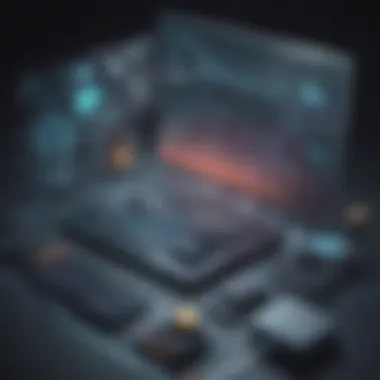Unveiling the Top Non-Fungible Token (NFT) Innovators Redefining Digital Assets


App Overview
As we delve into the realm of Non-Fungible Tokens (NFTs) and explore the most innovative startups driving the industry forward, it is crucial to understand the significance of these pioneering companies. These startups are revolutionizing the digital asset landscape by offering unique solutions, from tokenized collectibles to state-of-the-art digital art marketplaces. By reshaping how we perceive and interact with digital assets, they are playing a pivotal role in shaping the future of the digital economy, making them essential entities to follow closely.
Step-by-Step Walkthrough
To gain a comprehensive understanding of these NFT startups, let's embark on a detailed exploration of their key features and functionalities. By providing a step-by-step walkthrough, we aim to elucidate how users can navigate these platforms efficiently. Visual aids, such as screenshots and visuals for each step, will further enhance the clarity of the instructions, ensuring that users can seamlessly interact with the apps.
Tips and Tricks
For users looking to optimize their experience with these NFT startups, expert tips are invaluable. These insights can aid in maximizing app usage, uncovering hidden features, and discovering shortcuts that enhance productivity. By leveraging these tips and tricks, users can elevate their proficiency in utilizing these innovative platforms to their full potential.
Common Issues and Troubleshooting
While navigating these apps, users may encounter various challenges or issues. This section aims to address potential problems and offer effective troubleshooting techniques to resolve them promptly. By proactively providing solutions to common issues, users can experience a smooth and uninterrupted interaction with the NFT startup platforms.
App Comparison
Comparing these NFT startups with similar apps is essential to discern their unique selling points and differences. By highlighting the distinct features that set them apart from their counterparts, users can make informed decisions about which platform best aligns with their requirements. Analyzing these aspects comprehensively enables users to grasp the competitive landscape of NFT startups effectively.
Introduction to NFTs
In this article, we embark on a revelatory journey into the realm of Non-Fungible Tokens (NFTs), unraveling their intricacies and transformative potential within the digital landscape. NFTs have emerged as a groundbreaking innovation, revolutionizing the concept of ownership and authenticity in the digital sphere. Understanding the foundation of NFTs is paramount in grasping their profound implications on various industries, from art to gaming and beyond.
What Are NFTs?
Non-Fungible Tokens, commonly referred to as NFTs, represent unique digital assets secured by blockchain technology. Unlike fungible tokens such as cryptocurrencies, NFTs are indivisible and irreplicable, making each token distinct and one-of-a-kind. This uniqueness is verifiable on the blockchain, providing unparalleled transparency and validation of ownership.


Key Features of NFTs
NFTs derive their value from scarcity, immutability, and ownership verification. By leveraging smart contracts, NFTs enable creators to embed specific attributes or royalties, ensuring creators receive a share of subsequent sales. The interoperability of NFTs allows for seamless trade across various platforms, fostering a dynamic and liquid marketplace for digital assets.
Exploring the fundamental concepts of NFTs sets the stage for delving deeper into the diverse applications and innovations brought forth by NFT startups. By grasping the essence of NFTs, one can appreciate the disruptive potential and evolutionary trajectory of this burgeoning technology.
Understanding Non-Fungible Tokens
In this section, we delve deep into the crucial topic of Understanding Non-Fungible Tokens (NFTs), uncovering the intricate layers that define these unique digital assets. Understanding NFTs is pivotal in grasping the disruptive potential they hold in various industries, especially in digital art and collectibles. By comprehending the underlying technology and principles of NFTs, individuals can navigate the evolving landscape of decentralized ownership and tokenization with confidence and clarity. This exploration sheds light on the significance of NFTs as a paradigm shift in how we perceive and assign value to digital assets.
What Are NFTs?
To grasp the essence of Non-Fungible Tokens (NFTs), one must first understand their fundamental nature. NFTs are indivisible digital assets that represent ownership or proof of authenticity for unique items on the blockchain. Unlike fungible tokens such as cryptocurrencies, each NFT is distinct and cannot be exchanged on a one-to-one basis. This inherent uniqueness makes NFTs ideal for representing digital art, collectibles, and other one-of-a-kind assets, forging new avenues for creators and collectors to interact in the digital realm.
Key Features of NFTs
Key features underline the transformative potential of Non-Fungible Tokens, showcasing their versatility and practical applications in various domains. Immutability, scarcity, verifiability, and interoperability are among the core features that define NFTs. Immutability ensures that once tokenized, the asset's ownership and provenance are securely recorded on the blockchain, fostering trust and transparency. Scarcity adds value to NFTs, as the limited supply of unique tokens enhances their desirability and exclusivity in the market. Verifiability enables instant validation of an NFT's authenticity and ownership rights, bolstering trust among participants. Interoperability allows NFTs to interact seamlessly with different platforms and assets, unlocking new possibilities for cross-platform collaboration and utilization. Understanding these key features illuminates the distinctive qualities that set NFTs apart in the digital landscape.
Significance of NFT Startups
In delving into the multifaceted realm of NFT startups, it becomes evident that their significance transcends mere market trends. These pioneering entities stand at the forefront of a digital revolution, redefining ownership and authenticity in the virtual sphere. Through their innovative use of blockchain technology, NFT startups offer a decentralized platform for creators to showcase and monetize their unique digital assets. By eliminating the need for intermediaries and enabling direct peer-to-peer transactions, these startups empower artists and collectors, fostering a more inclusive and transparent ecosystem. Moreover, NFT startups drive the democratization of art and collectibles, opening up new avenues for global participation and appreciation. The transformative potential of NFT startups extends beyond the art world, with implications for various industries seeking to leverage blockchain for value exchange and digital asset management. As these startups continue to push boundaries and explore new use cases, their significance lies in catalyzing an evolutionary shift towards a tokenized economy built on trust, creativity, and technological innovation.
Impacting the Digital Art Market
Within the dynamic landscape of NFT startups, their impact on the digital art market is palpable and profound. By providing artists with a novel medium to create, exhibit, and sell their work, NFT startups challenge traditional notions of art ownership and commodification. Through the issuance of unique digital tokens tied to specific artworks, these startups enable artists to establish provenance and establish scarcity in a digital environment. This groundbreaking approach not only revolutionizes how art is perceived and valued but also disrupts existing power structures within the art industry. NFT startups empower artists to directly engage with their audience, cultivate new revenue streams, and gain international recognition without traditional gatekeepers. Moreover, by introducing blockchain-based authentication and smart contract mechanisms, these startups enhance the security and transparency of art transactions, mitigating issues of fraud and forgery.
Revolutionizing Tokenized Collectibles
In the realm of tokenized collectibles, NFT startups are redefining the concept of ownership and memorabilia. By leveraging blockchain technology, these startups offer collectors a secure and verifiable way to acquire and trade digital assets. From virtual trading cards to unique virtual real estate, NFT startups enable users to own scarce, digital commodities that hold intrinsic and speculative value. This paradigm shift in collectibles not only transcends physical limitations but also opens up a new frontier for creating and exchanging digital memorabilia. NFT startups facilitate the tokenization of assets that were previously confined to the physical world, allowing collectors to diversify their portfolios and engage with a global community of like-minded enthusiasts. By pioneering innovative ways to represent and transfer ownership of collectibles, these startups democratize the collecting experience, making it more accessible, transparent, and inclusive for a broader audience.


Top NFT Startups to Watch
In the realm of Non-Fungible Tokens (NFTs), keeping an eye on the top NFT startups is crucial for investors, enthusiasts, and tech-savvy individuals looking to delve into this innovative space. These startups are at the forefront of reshaping the digital asset landscape, offering unique opportunities and challenges. Understanding the significance of these top NFT startups can provide valuable insights into the evolving market trends and innovative applications driving the industry forward.
ArtBlocks
ArtBlocks is a pioneering NFT platform that stands out for its focus on generative art and unique tokenized creations. By leveraging smart contracts on the Ethereum blockchain, ArtBlocks enables artists to produce algorithmically generated artworks that are tokenized as NFTs. This approach sets ArtBlocks apart, offering collectors rare and one-of-a-kind digital assets that are algorithmically generated. The platform's attention to innovation and creativity has garnered significant attention within the NFT community, positioning it as a key player in the digital art marketplace.
OpenSea
As one of the largest NFT marketplaces globally, OpenSea plays a critical role in connecting buyers and sellers in the digital asset ecosystem. The platform offers a diverse range of NFTs, including art, collectibles, domain names, and virtual worlds, providing users with a vast marketplace to discover and trade unique digital assets. OpenSea's user-friendly interface and wide selection of NFTs have made it a popular choice for both seasoned collectors and newcomers to the NFT space. With its commitment to fostering a vibrant NFT community, OpenSea continues to drive innovation and accessibility in the digital collectibles market.
Rarible
Rarible stands out as a decentralized NFT marketplace that empowers creators to mint, buy, and sell digital collectibles without the need for intermediaries. The platform's integration of decentralized finance (DeFi) technologies allows users to engage in fractional ownership and governance of digital assets, offering a new level of financial flexibility and creative control. Rarible's focus on community-driven initiatives and transparent marketplace operations has attracted a dedicated user base seeking a more decentralized and equitable NFT ecosystem.
Axie Infinity
Axie Infinity emerges as a unique NFT project that combines elements of blockchain technology with gaming and digital collectibles. With a play-to-earn model that rewards players for participating in the ecosystem, Axie Infinity has captured the attention of gamers and investors alike. The platform's innovative approach to creating a digital pet universe where NFT assets hold tangible value has set a new standard for blockchain-based gaming experiences. As Axie Infinity continues to expand its ecosystem and introduce new features, it remains a standout player in the evolving landscape of NFT gaming platforms.
Innovative Approaches by NFT Startups
Being the bedrock of ingenuity in the NFT realm, 'Innovative Approaches by NFT Startups' stands out as a beacon of forward-thinking strategies and groundbreaking initiatives reshaping the digital landscape. In this article, we delve deep into the dynamic world of NFT startups to uncover the essence of innovation driving these transformative ventures. By focusing on the specific elements, benefits, and considerations of groundbreaking approaches adopted by NFT startups, we illuminate the path towards a deeper understanding of this pivotal topic.
Innovative approaches by NFT startups are not just mere trends but rather strategic maneuvers that rewrite the rules of engagement in the digital economy. These approaches encompass a spectrum of avant-garde techniques, ranging from novel tokenization methods to revolutionary platform integrations, all aimed at pushing the boundaries of what is possible with NFTs. By exploring these avant-garde strategies, we unravel the intricate tapestry of innovation that underpins the success of NFT startups in a rapidly evolving market landscape.
One key aspect of innovative approaches by NFT startups is their ability to foster creativity and authenticity in the digital realm. By introducing novel concepts and out-of-the-box solutions, these startups empower creators and users alike to explore new horizons and redefine the very essence of digital ownership. Through custom-built frameworks and cutting-edge technologies, NFT startups pave the way for a future where imagination knows no bounds and innovation reigns supreme.


Moreover, the benefits of embracing innovative approaches in the NFT space extend far beyond mere technological advancements. By fostering a culture of experimentation and exploration, NFT startups inspire a new wave of creativity and collaboration, opening doors to unprecedented opportunities for artists, collectors, and enthusiasts alike. These benefits ripple across the digital ecosystem, creating a fertile ground for burgeoning talents and seasoned veterans to thrive and expand their influence.
As we navigate the intricate web of innovative approaches by NFT startups, it is crucial to consider the implications and challenges that accompany such progressive strategies. From scalability concerns to regulatory hurdles, NFT startups face a myriad of obstacles on their quest for innovation. By addressing these considerations head-on and devising robust solutions, these startups demonstrate resilience and adaptability in the face of uncertainty, forging new paths towards sustainable growth and success in the ever-evolving NFT landscape.
Challenges and Opportunities in the NFT Space
In the realm of Non-Fungible Tokens (NFTs), navigating the landscape of challenges and opportunities is imperative for startups and stakeholders alike. Understanding the intricacies of this dynamic industry segment is crucial for making informed decisions and capitalizing on emerging trends.
When examining the challenges within the NFT space, regulatory concerns loom large as a critical consideration. Regulations play a pivotal role in shaping the legal framework within which NFT startups operate. Addressing issues related to intellectual property rights, copyright infringement, and consumer protection is paramount to ensure compliance and mitigate potential legal risks. Navigating the evolving regulatory landscape demands vigilance and proactive measures to stay abreast of changing guidelines and requirements.
Similarly, scalability emerges as a prevalent issue affecting NFT startups seeking to expand their operations and user base. As the popularity of NFTs continues to surge, scalability concerns encompass technical challenges related to network congestion, transaction speed, and infrastructure scalability. Ensuring the seamless functionality of NFT platforms under high demand scenarios requires robust technological solutions and strategic scalability planning. Overcoming scalability hurdles is essential for driving sustainable growth and enhancing user experience within the competitive NFT ecosystem.
Regulatory Concerns
Within the sphere of regulations impacting NFT startups, a multifaceted landscape of legal considerations comes into play. From intellectual property rights to securities regulations, navigating the regulatory framework is essential for ensuring compliance and legitimacy in the NFT space. Intellectual property concerns, such as copyright infringement and unauthorized use of digital assets, pose significant challenges for startups operating in the decentralized NFT marketplace. Implementing robust measures to safeguard intellectual property rights and address legal ambiguities is crucial for fostering trust among users and stakeholders.
Moreover, securities regulations present a complex regulatory landscape for NFT projects venturing into tokenization and fundraising activities. Compliance with securities laws is vital to mitigate legal risks associated with offering NFTs as investment instruments. Striking a balance between innovation and regulatory compliance is paramount for NFT startups to thrive in a regulated environment while navigating the intricacies of evolving legal requirements.
Scalability Issues
The scalability of NFT platforms is a critical aspect that demands strategic planning and technological innovations. Scalability issues encompass the ability of NFT marketplaces to handle increasing transaction volumes, optimize gas fees, and enhance user experience. Addressing scalability challenges requires a comprehensive approach that integrates scalability solutions, such as layer 2 scaling solutions, interoperability protocols, and network optimizations.
Ensuring seamless scalability is vital for sustaining growth and attracting a wide user base to NFT platforms. By leveraging cutting-edge technologies and performance optimizations, NFT startups can enhance platform efficiency, support high-speed transactions, and provide a seamless user experience. Overcoming scalability hurdles empowers NFT projects to position themselves competitively in the ever-evolving digital marketplace, driving innovation and user adoption.
Future Prospects for NFT Startups
In the ever-evolving landscape of Non-Fungible Tokens (NFTs), exploring the future prospects for NFT startups is vital for understanding the trajectory of this innovative industry. As blockchain technology continues to advance and digital assets gain prominence, the intersection of NFTs and the metaverse represents a paradigm shift in how we perceive ownership and engagement with virtual assets. The potential for NFT startups to thrive lies in their adaptability to emerging technologies and market trends. By envisioning new applications and use cases for NFTs beyond the current scope, startups can position themselves at the forefront of digital innovation.
Integration with Metaverse
Integration with the metaverse encapsulates the seamless integration of NFTs into virtual worlds and digital environments. As the metaverse expands to encompass a multitude of interconnected virtual spaces, NFTs offer a unique opportunity for users to truly own and showcase digital assets within these immersive domains. The fusion of NFTs and the metaverse not only enhances the value of virtual experiences but also blurs the lines between physical and digital ownership. NFT startups exploring metaverse integration are paving the way for a future where virtual assets hold tangible value and significance across online realms.
Emergence of NFT Gaming Platforms
The emergence of NFT gaming platforms marks a revolutionary moment in the gaming industry, where players can truly own in-game assets as NFTs. By leveraging blockchain technology, NFT gaming platforms empower players to buy, sell, and trade virtual items with real-world value. This paradigm shift not only enhances player agency and ownership but also introduces new revenue streams for game developers and publishers. As NFT gaming platforms gain traction, the gaming landscape is evolving into a more decentralized and player-centric ecosystem, fostering creativity and innovation in game design and virtual economies.







